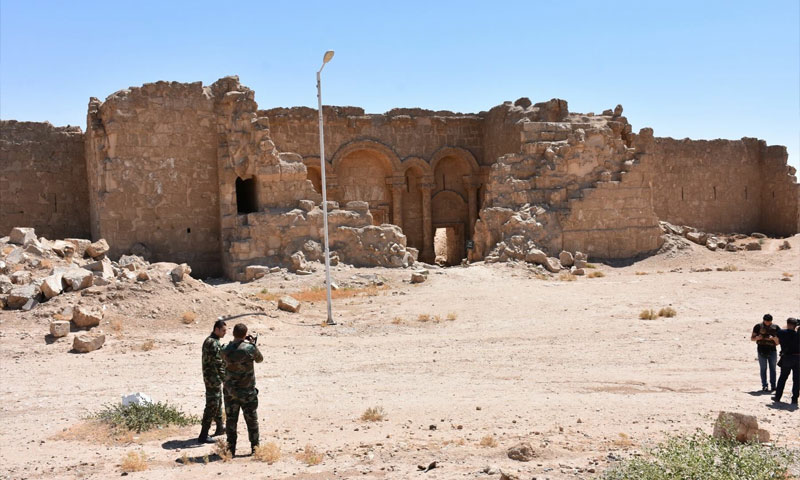



The city of Raqqa is a shelter for many historical ruins and archeological sites, which date back to the very beginning of the city, prior to 242 BC.
The seven past years changed the reality of the city, for it has been a source of attraction to the different parties to the conflict, who in turns ruled the city and tried to miss with its identity.
| Baghdad Gate, the wall of Raqqa, Qasr al-Banat (Palace of the Ladies), Harqaleh Castle, Ja’bar Castle suffered the consequences of areal and artillery shelling; however, they survived to keep witness to the areas present, the way they attested for its history, to which people have always held tight being a source of pride to them. |
Since 2014, when the “Islamic State” (ISIS) took Raqqa over, the arachnological sites endured many violations by the different parties to the conflict, starting with ISIS’ attempt to erase the city’s identity and the destruction it inflicted on a number of ruins and statues, at the pretext of preventing “idolatry,” to end with the artillery and areal bombardment by the Syrian regime and the US-led coalition aircraft, which justified their action based on the need to eliminate “terrorism.”
“Steadfast as its history,” are the words which the people use to describe their city, which experienced all types of destruction, when the “Islamic State” proclaimed it as the capital of the caliphate for three years, after which it was ruled by the “Syrian Democratic Forces,” with the support of the US-led coalition in October 2017.
Ismael al-Haj from Raqqa described the city to Enab Baladi, saying: “Raqqa is ancient and incubates many archeological landmarks, such as the ancient wall, the Baghdad Gate and many others. Most of these ruins date back to the Abbasid era, when Harun al-Rashid, the Abbasid Caliph took Raqqa, or al-Rafqqa as it used to be called back then, as his capital, due to its strategic location and the beauty of its nature, which the Euphrates river gives a special sheen.”
“Raqqa have always derived steadfastness from its ruins,” al-Haj adds saying: “If the ruins, today, are still standing in the face of all the destruction, despite their ancientry and their fragile dust infrastructure, then, what about the people of Raqqa who are renewing their hope in life every day?”
According to the statistics issued by the Directorate-General of Antiquities and Museums, the size of loss and damage which befell the ruins in Syria, to mid-2015, reached about 750 buildings and sites, including 140 archeological sites, in addition to more than a thousand shops in Aleppo’s Old Market.
Forty-eight museums and sites open to visits were liable to damage due to war, the most important of which is the Raqqa Museum, for about a thousand archeological pieces were stolen, in addition to the robbery of “Harqaleh” Castle’s storages, which were located beside the city and used for keeping the findings of the excavation convoys which functioned in the governorate.
History-Based Hope
Abu Mohammad, one of the Raqqa’s old neighborhoods’ residents and who bore witness to the military conflict in the past seven years, said” The city’s ancient wall, close to my house, have always been a source of hope in life to me, since that wall, with its tattered clay, managed to survive, undoubtedly, my family and I will be definitely able to survive.”
Um Mohammad agrees with her husband, for with each air raid, she used to shiver with fear for herself, for her children and husband, the family’s only breadwinner, who used to sit in front of the house’ door during the raids. However, she remembers “the grand reassurance, which my husband has given me when he talked about the ancient wall, the Baghdad Gate and the Place of the Ladies’ steadfastness.”
“Logically, if death and destruction were supposed to be the fate of the city, these ruins would have vanished, but in their survival, lies the wisdom, that life without hope is death disguised as life,” Um Mohmmad concludes.
Dozens of Raqqa’s people are returning to their city every day, convinced that its spirit would not rise from the dust of the war, unless all its children gather to cooperate in rebuilding the destroyed place anew.
if you think the article contain wrong information or you have additional details Send Correction